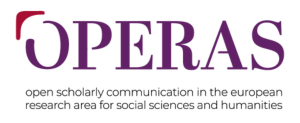Common Standards and FAIR Principles
Open Science represents a new approach to the research process that seeks to ensure that access to the entire life cycle of research remains fundamentally open and replicable. The SIG “Common Standards and FAIR Principles” aims at exploring the workflows, mediums and technical standards that have recently emerged as a result of the changes brought about by the transition to Open Science. In the context of the work undertaken by the SIG, common standards and FAIR (findable, accessible, interoperable, and reusable) principles are examined as key operational and technical aspects that ensure content quality and interoperability for scholarly output in the social science and humanities (SSH).
The importance of common standards and FAIR Principles in the context of open scholarly communication
In the scholarly communication digital landscape there is a multiplicity of workflows, object types and content carriers/mediums. Also there is a variety of stakeholders with different roles and needs. For these reasons the introduction of common standards into the scholarly communication digital landscape becomes a subject of crucial importance. Common standards are important in different ways for each group of stakeholders. Researchers need inclusive publishing venues to accommodate new types of research outputs, to link research data to publications, and the support of collaborative work. For publishers and platforms common standards are needed for the creation of new tools and services for researchers, the optimization of digital workflows, the creation of innovative publication models and for content to be delivered in multiple formats. Journals need common quality standards and guidelines at the disciplinary level for authors, reviewers, and readers. Common standards and guidelines will enable these users to know what they can expect in their interaction with the journals that have adopted such standards (governance, editorial policies, data policies, ethics, research integrity, preservation). Funders need common standards for the identification and interlinking of all agents and outputs of a funded research project. For Infrastructure providers long-term preservation and utilization of the content and tools to enable identification, authentication, metadata enrichment and discovery require the existence of common standards. GLAM institutions (galleries, libraries, archives, and museums) assume new roles as publishers and curators, they handle digital versions of printed content, and they can offer services for long-term preservation of digital resources.
Objective
The main goal of the SIG is to trace the standards at platform and inter-platform level, and identify key areas for their implementation, as an essential step to ensure content quality, as well as findability and accessibility, interoperability, and reusability, i.e. compliance with the FAIR principles.
A Brief history of the Common Standard and FAIR Principles Special Interest Group
The SIG was launched in June 2017 under the name “Working Group” in the context of OPERAS. Following the creation of the OPERAS legal entity in March 2020, the Working Groups have been relaunched as “Special Interest Groups” (SIGs). The object of the SIG has been enriched with FAIR principles, as the main focus of the FAIR principles are the common standards. Consequently the name of the SIG changed to Common Standards and FAIR Principles in 2020. The workings of this SIG has resulted in the publication of two White Papers: The first in 2018, and a revised version in July 2021.
Publications
Contact Point
National Documentation Centre of Greece (EKT)
Special Interest Groups Members
DOAB
IBL PAN
LingOA – Linguistics in Open Access
OpenEdition
University of Bielefeld
University of Groningen
